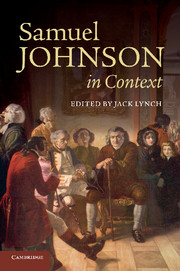Book contents
- Frontmatter
- Contents
- Illustrations
- Contributors
- Preface
- Chronology
- Abbreviations
- Part I Life and works
- Part II Critical fortunes
- Part III Contexts
- Chapter 10 America
- Chapter 11 Anglicanism
- Chapter 12 Anthropology
- Chapter 13 Authorship
- Chapter 14 Biography
- Chapter 15 Book trade
- Chapter 16 Clubs
- Chapter 17 Conversation
- Chapter 18 Dictionaries
- Chapter 19 Domestic life
- Chapter 20 Education
- Chapter 21 Empire
- Chapter 22 Essays
- Chapter 23 Fiction
- Chapter 24 History
- Chapter 25 Journalism
- Chapter 26 Law
- Chapter 27 Literary criticism
- Chapter 28 London
- Chapter 29 Medicine
- Chapter 30 Mental health
- Chapter 31 Money
- Chapter 32 Nationalism
- Chapter 33 Philosophy
- Chapter 34 Poetry
- Chapter 35 Politics
- Chapter 36 Scholarship
- Chapter 37 Science and technology
- Chapter 38 Scotland
- Chapter 39 Sermons
- Chapter 40 Shakespeare
- Chapter 41 Slavery and abolition
- Chapter 42 Social hierarchy
- Chapter 43 Theatre
- Chapter 44 Travel
- Chapter 45 Visual arts
- Chapter 46 War
- Chapter 47 Women writers
- Further reading
- Index
- References
Chapter 13 - Authorship
from Part III - Contexts
Published online by Cambridge University Press: 05 June 2012
- Frontmatter
- Contents
- Illustrations
- Contributors
- Preface
- Chronology
- Abbreviations
- Part I Life and works
- Part II Critical fortunes
- Part III Contexts
- Chapter 10 America
- Chapter 11 Anglicanism
- Chapter 12 Anthropology
- Chapter 13 Authorship
- Chapter 14 Biography
- Chapter 15 Book trade
- Chapter 16 Clubs
- Chapter 17 Conversation
- Chapter 18 Dictionaries
- Chapter 19 Domestic life
- Chapter 20 Education
- Chapter 21 Empire
- Chapter 22 Essays
- Chapter 23 Fiction
- Chapter 24 History
- Chapter 25 Journalism
- Chapter 26 Law
- Chapter 27 Literary criticism
- Chapter 28 London
- Chapter 29 Medicine
- Chapter 30 Mental health
- Chapter 31 Money
- Chapter 32 Nationalism
- Chapter 33 Philosophy
- Chapter 34 Poetry
- Chapter 35 Politics
- Chapter 36 Scholarship
- Chapter 37 Science and technology
- Chapter 38 Scotland
- Chapter 39 Sermons
- Chapter 40 Shakespeare
- Chapter 41 Slavery and abolition
- Chapter 42 Social hierarchy
- Chapter 43 Theatre
- Chapter 44 Travel
- Chapter 45 Visual arts
- Chapter 46 War
- Chapter 47 Women writers
- Further reading
- Index
- References
Summary
A′UTHOR. n.s. [auctor, Lat.]
4. A writer in general.
Yet their own authors faithfully affirm,
That the land Salike lies in Germany. Shakesp. Henry V.
To understand both Johnson’s career as an author and his writings about authorship, it can help to situate him in the context of mid-eighteenth-century authorship: who were authors in Johnson’s day? What changes were under way in the conditions and forms of authorship, from the days of Johnson’s first publication in 1735 to his posthumously published piece in 1785? What kinds of literary work were available to them? How were authors regarded by their contemporaries?
A republic of letters
It is commonly suggested that over the course of Johnson’s lifetime authorship was transformed – partly by Johnson’s own example – from ill-paid drudgery, ignominious dependence on a patron, or gentlemanly amateurism to a highly respected and well-remunerated “profession.” Literary historians in recent years focusing on the growth of print culture in the eighteenth century, on the development of a literary marketplace, on the Copyright Act of 1709 and the end of perpetual copyright in 1774, and on the “birth of the modern author” have supported this picture of progress by authors towards “independence.” But these terms have been underdefined, and their loose use distorts the world in which authors worked. The Copyright Act, for example, was regarded in its own day as a “booksellers’ bill”: it protected not an author, who commonly sold his rights, but the bookseller who bought them. The end of perpetual copyright had virtually no effect on new writing. It would be more accurate to say that change was slow and uneven, that authorship took many forms, that some older cultural practices persisted, including patronage and what has been called “scribal culture” (writing but choosing not to print), and that in the closing years of the eighteenth century most authors who sought to print still struggled not only to succeed but also to gain respect.
- Type
- Chapter
- Information
- Samuel Johnson in Context , pp. 118 - 126Publisher: Cambridge University PressPrint publication year: 2011

